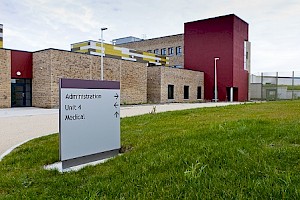Youth Justice
Ireland has a long history of poor responses to offending behaviour by children. A core strand to IPRT's work since its establishment in 1994 has been the promotion of a more effective youth justice system, with emphasis on non-custodial alternatives, diversion, early intervention and prevention strategies and programmes. Central to our work was ending the practice of detaining children in adult prisons, which was in breach of international human rights standards and a serious stain on Ireland's human rights record.
International human rights standards, and in particular the provisions of the UN Convention on the Rights of the Child, are clear that custody for children should only be used as a last resort and for the minimum required period of time. All efforts should be made to apply alternatives to detention to ensure that such a measure is only used in exceptional circumstances.
In Ireland, the Children Act 2001 recognizes the principle of detention as a last resort. The Act prohibits the imprisonment of children and the Criminal Justice Act 2006 makes provision for all children less than 18 years of age to be detained in Children Detention Schools. The detention school model is focused on a model of care, education, health and programmes that address offending, with improved outcomes for the young people, their communities and all of society. The Irish Youth Justice Service is responsible for the Children Detention Schools, within the Department of Children and Youth Affairs.
Following years of sustained advocacy by IPRT, along with many national and international bodies, in 2012 the detention of boys aged under 17 at St Patrick's Institution ended. In March 2017, a Ministerial Order ended the sentencing of children aged under 18 to adult prison in Ireland, and in April 2017, St. Patrick’s Institution was finally closed. Since September 2017 boys aged under 18 are no longer detained in the adult prison system.
IPRT continues to work towards progressive change in youth justice policies and practice, as well as engaging with wider policy and practice issues relating to youth justice, such as the provision of alternatives to detention, diversion and early intervention programmes.

IPRT welcomes extension of youth diversion projects and initiatives
15th May 2015
IPRT welcomes two announcements in the area of youth justice this week by Minister for Justice and Equality Frances Fitzgerald TD.

Turnaround Youth - Launch
12th May 2015
IPRT launched our Turnaround Youth Project and Report on Tuesday 12th May 2015 in the Irish Film Institute, Dublin 2.

Turnaround Youth: Young Adults (18-24) in the Criminal Justice System
12th May 2015
This IPRT report presents the case for the differential treatment of young adults aged 18-24 who come in contact with the criminal justice system, and is grounded in emerging evidence, best practice, and informed by input from young people with experience of the issues.
Morning Ireland: Criticism of delays in progress of Oberstown
26th March 2015
Why has it taken so long to end the detention of under 18s in adult prisons?
HIQA inspection report of Oberstown children detention school campus
25th February 2015
IPRT welcomes the publication by HIQA of its reports on two inspections of the Oberstown children detention school campus, which took place 28-30 October and 4 November 2014. The inspection reports were published alongside an Action Plan, which includes details on actions already taken to address issues of concern.
The Children's Rights Alliance Report Card 2015
23rd February 2015
The Children's Rights Alliance (CRA) have published their Report Card for 2015, which analyses and assesses the government's performance in addressing and fulfilling their stated commitments for children in the Programme for Government.
Le Chéile’s Restorative Justice Project in Limerick
28th January 2015
Evaluation of Le Chéile’s Restorative Justice Project in Limerick reveals returns of nearly €3 for every €1 invested.
Increase in funding for social inclusion measures to tackle youth crime
19th December 2014
IPRT welcomes the announcement by the Minister for Justice and Equality of an increased allocation to the Irish Youth Justice Service Community Programmes, which will see an expansion of Garda youth diversion programmes.

Children's Rights Behind Bars: Report
11th December 2014
Children’s Rights Behind Bars is a collaboration between 16 European and International organisations. Its goal is to increase the respect of human rights of children deprived of liberty and improve the implementation of international juvenile justice standards to protect the rights and needs of incarcerated children.
Catch22: 'Gangs in prison' report
19th November 2014
A report launched by Catch22 highlights the issues of 'Gangs in Prison' in the UK.




